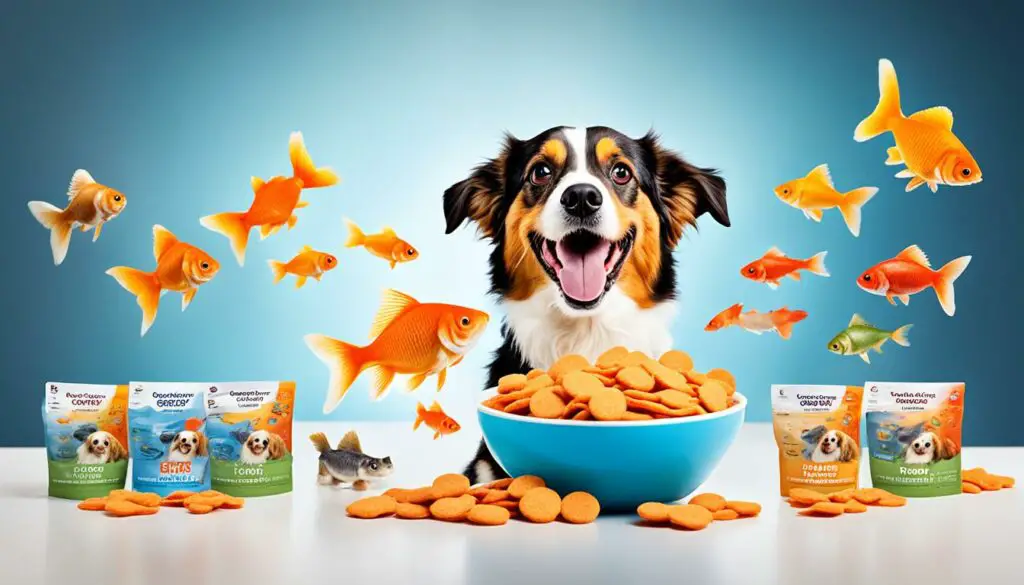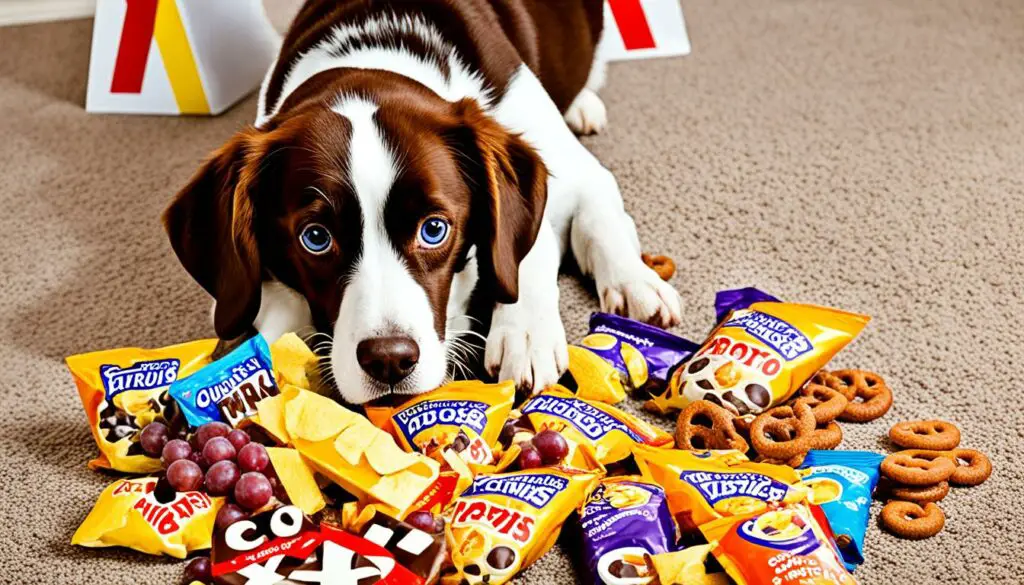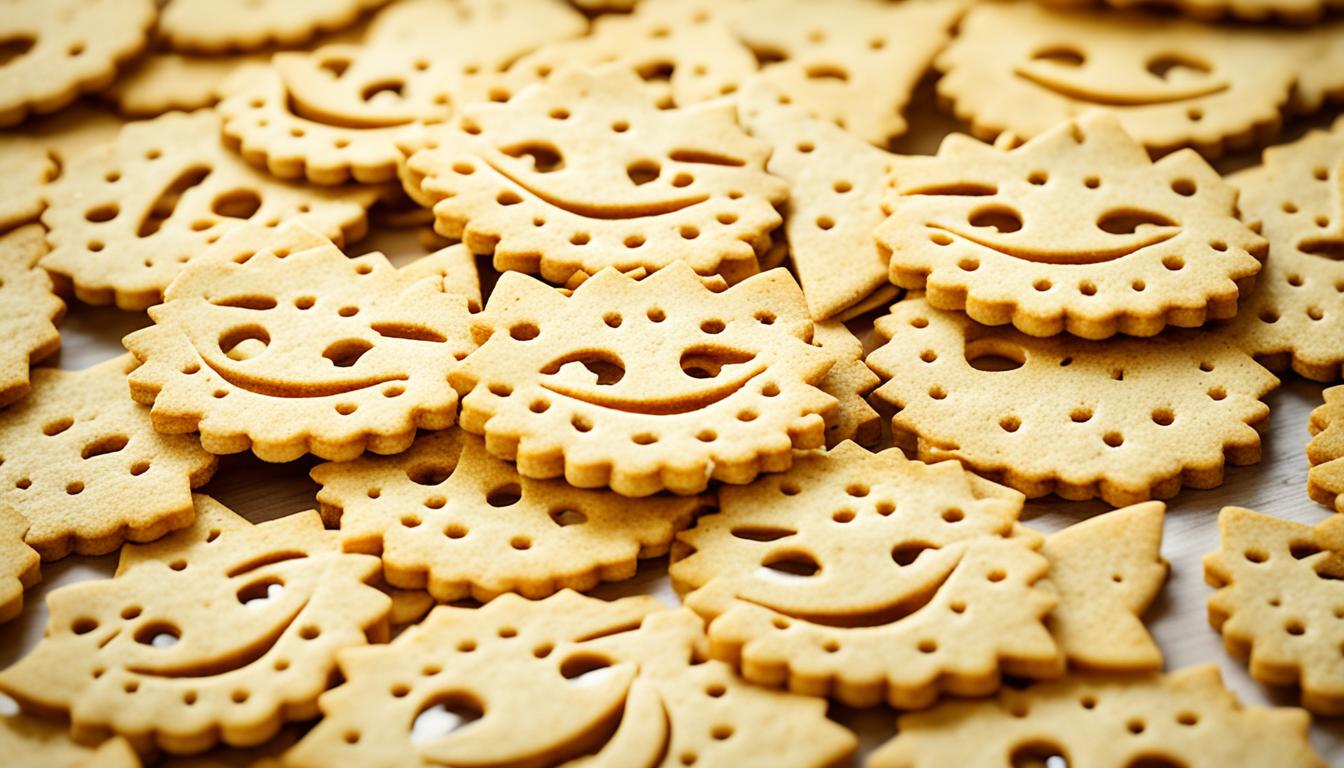Last Updated on 2 weeks by admin
Goldfish crackers are a popular snack enjoyed by many, but can dogs safely consume them? While the answer is not a simple yes or no, it is generally recommended to avoid feeding goldfish crackers to dogs regularly. Although a small amount of goldfish crackers may not cause harm, they do not provide any significant nutritional benefits to dogs and can contain ingredients that are not ideal for their health.
While dogs can technically eat goldfish crackers in small quantities without immediate harm, it is generally recommended to avoid feeding them this snack. Goldfish crackers do not provide significant nutritional benefits and can contain ingredients that may be harmful to dogs, such as high salt content and spices like onion powder. It is best to opt for healthier and more appropriate snack options that meet a dog’s dietary needs.
Key Takeaways:
- Feeding goldfish crackers to dogs is generally not recommended on a regular basis.
- Goldfish crackers do not offer significant nutritional benefits for dogs.
- They can contain ingredients, high salt content, and spices like onion powder that may be harmful to dogs.
- It is best to choose healthier snack options specifically formulated for dogs.
- Consult with a veterinarian for guidance on safe and appropriate dog treats.
What Are Goldfish Crackers Made Of?
Goldfish crackers are a popular snack enjoyed by many, but have you ever wondered what exactly they’re made of? Let’s take a closer look at the ingredients that make up these bite-sized treats.
“Goldfish crackers are made primarily of enriched wheat flour, cheddar cheese, vegetable oils (canola, soybean, and/or sunflower oils), salt, and various spices and additives.”
The main components of goldfish crackers include:
- Enriched wheat flour: This is the base ingredient for goldfish crackers and provides the bulk of their texture and structure.
- Cheddar cheese: The cheesy flavor that goldfish crackers are known for comes from real cheddar cheese.
- Vegetable oils: Canola, soybean, and/or sunflower oils are used to give the crackers a crispy texture.
- Salt: Salt is added to enhance the flavor of the crackers.
- Various spices and additives: Goldfish crackers may contain spices like onion powder, garlic powder, and other flavorings to enhance their taste.
While some of these ingredients, such as cheddar cheese, can provide nutritional benefits, others, like the vegetable oils and high salt content, may not be ideal for dogs. Additionally, the presence of spices like onion powder can be concerning as they can be harmful to dogs in large amounts.
Are Goldfish Crackers Good for Dogs?

When it comes to the question of whether goldfish crackers are good for dogs, the answer is clear. These popular snacks do not offer significant benefits to our canine companions. While it may be tempting to share a few crackers with your furry friend, it’s important to consider their nutritional needs. Dogs have different dietary requirements than humans, and their health and well-being depend on a balanced diet that provides essential nutrients.
Goldfish crackers are low in nutrients and can be high in salt and unhealthy fats, which are not ideal for dogs. While they may provide some carbohydrates for energy, there are better options available that can better meet a dog’s nutritional needs. It’s important to prioritize their health by choosing snacks that offer genuine benefits and contribute to their overall well-being.
When selecting snacks for your dog, consider options that provide nutritional value and are specifically formulated for canine consumption. There are many healthy alternatives that can be enjoyed in moderation. These snacks not only cater to a dog’s dietary needs but also offer various health benefits.
The Nutritional Value of Goldfish Crackers for Dogs
Goldfish crackers may not satisfy a dog’s dietary requirements due to their limited nutritional value. Here is a breakdown of the nutritional content of goldfish crackers per 30g serving:
| Nutrient | Amount |
|---|---|
| Calories | 150 |
| Total Fat | 6g |
| Saturated Fat | 1g |
| Cholesterol | 10mg |
| Sodium | 250mg |
| Total Carbohydrates | 20g |
| Dietary Fiber | 1g |
| Sugars | 1g |
| Protein | 3g |
As we can see from the nutritional breakdown, goldfish crackers are relatively high in calories, fat, and sodium, while offering limited fiber, protein, and essential nutrients. While a small amount may not cause immediate harm, it is best to opt for healthier snack alternatives that provide more nutritional value and contribute to a dog’s overall well-being.
It’s important to remember that dogs have different digestive systems and nutritional needs compared to humans. Feeding them foods that are not suitable for their dietary requirements can lead to various health issues in the long run.
“While goldfish crackers may seem harmless, they don’t offer the same nutritional benefits for dogs as they do for humans. It’s best to choose dog-friendly snacks that provide the necessary nutrients and contribute to their overall health.” – Dr. Emily Brown, Canine Nutrition Expert
When it comes to the well-being of our beloved furry friends, it’s crucial to make informed choices about their diet. Opting for snacks that are specifically designed for dogs and meet their nutritional needs ensures that we are providing them with the best care possible.
Next, we will explore whether goldfish crackers are poisonous to dogs and what steps to take if your dog has eaten a significant amount of these crackers.
Are Goldfish Crackers Poisonous to Dogs?

Goldfish crackers are a popular snack enjoyed by many, but are they safe for dogs to eat? While goldfish crackers are not considered highly toxic to dogs, they do contain ingredients that can be harmful in large quantities. It is important to understand the potential risks before sharing this snack with your furry friend.
One of the concerns with goldfish crackers is their high salt content. Dogs have different dietary needs than humans, and excessive salt intake can lead to dehydration and sodium toxicity. Additionally, goldfish crackers may contain spices like onion powder and garlic powder, which can be harmful to dogs, even in small amounts. These spices can cause problems such as anemia.
Although a small amount of goldfish crackers is unlikely to cause immediate harm to dogs, it is best to avoid feeding them to dogs regularly. Instead, opt for healthier snack options that are specifically formulated for dogs and meet their nutritional needs.
If you suspect that your dog has consumed a large quantity of goldfish crackers or is exhibiting any signs of discomfort or illness, it is important to contact your veterinarian for guidance and advice. They can provide the best course of action based on your dog’s individual needs.
In summary, while goldfish crackers may not be highly toxic to dogs, they can contain ingredients that are not ideal for their health. It is always best to prioritize your dog’s well-being by choosing snacks that are specifically designed for their dietary needs.
| Toxic Ingredients in Goldfish Crackers | Potential Risks |
|---|---|
| High Salt Content | – Dehydration – Sodium Toxicity |
| Spices (Onion Powder, Garlic Powder) | – Anemia |
Remember, your dog’s health should always be a top priority. When in doubt, consult with your veterinarian to ensure that you are making the best choices for your furry friend.
What Should I Do if My Dog Has Eaten Lots of Goldfish Crackers?

If your dog has consumed a large quantity of goldfish crackers, it is important to monitor them closely for any signs of discomfort or illness. Symptoms such as increased thirst, vomiting, diarrhea, abdominal discomfort, lethargy, seizures, or dehydration could indicate potential issues. In such cases, it is recommended to contact your veterinarian for guidance and advice on how to proceed.
Are There Other Potentially Harmful Snacks?

Goldfish crackers are not the only snacks that can be potentially harmful to dogs. It’s essential to be cautious about the foods we share with our furry friends. Some human snacks can be toxic to dogs and should be strictly avoided. Let’s take a look at some examples of harmful snacks for dogs:
1. Chocolate
Chocolate, especially dark and unsweetened varieties, contains theobromine, which is toxic to dogs. Even small amounts can lead to symptoms such as vomiting, diarrhea, irregular heart rhythm, and in severe cases, seizures or even death.
2. Raisins
Raisins and grapes can cause kidney failure in dogs. Consumption can lead to symptoms such as vomiting, diarrhea, abdominal pain, and increased urination. It’s best to keep raisins and grapes out of your dog’s reach.
3. Nuts
Some nuts, like macadamia nuts and walnuts, can be toxic to dogs. Nuts are high in fat and can cause pancreatitis in dogs. Additionally, the high salt content in salted nuts is not suitable for canine consumption.
4. Candy
Candy, especially those containing xylitol, an artificial sweetener, can be extremely dangerous for dogs. Xylitol ingestion can cause a sudden drop in blood sugar levels, leading to seizures, liver failure, or even death.
It is crucial to be mindful of these harmful snacks and avoid feeding them to your dogs. Keeping your canine companion’s health and well-being in mind, consider providing them with dog-friendly treats and snacks that are specifically formulated to meet their nutritional needs.
| Harmful Snack | Potential Consequences |
|---|---|
| Chocolate | Toxicity, vomiting, diarrhea, irregular heart rhythm, seizures |
| Raisins | Kidney failure, vomiting, diarrhea, increased urination |
| Nuts | Toxicity, pancreatitis, high salt content |
| Candy (with xylitol) | Hypoglycemia, seizures, liver failure |
Remember, just because a snack is enjoyable for us humans, it doesn’t mean it’s safe for our furry friends. Always prioritize your dog’s health and choose snacks that are specially made for them.
https://www.youtube.com/watch?v=gtdrwuzSKBM
When it comes to treating your furry friend, it’s essential to provide them with healthy and safe options. Fortunately, there is a wide range of delicious and nutritious snacks that you can share with your dog. These dog-friendly treats are not only tasty but also offer various health benefits.
Here are some examples of healthy dog snacks that you can safely share:
- Plain Popcorn: Popcorn without any toppings or seasonings can be a low-calorie snack for dogs. It’s important to avoid adding butter, salt, or other flavors that may be harmful. Plain, air-popped popcorn can be a satisfying treat for your canine companion.
- Vegetable Sticks: Carrot and cucumber sticks are excellent options for dog-friendly snacks. These vegetables are low in calories and high in fiber, providing a crunchy and refreshing treat for your dog.
- Lean Strips of Cooked Meat: Chicken or turkey strips that are cooked without seasoning or spices can be a healthy protein-rich snack for your dog. Ensure that the meat is lean and free from any bones or excess fat.
- Certain Fruits: Some fruits, such as blueberries, strawberries, and watermelon, can be enjoyed by dogs in moderation. These fruits are packed with vitamins, minerals, and antioxidants, offering a sweet and nutritious snack option.
These healthy snacks provide dogs with essential nutrients and can be incorporated into their diet in moderation. It’s important to remember that each dog is unique, and dietary restrictions or allergies should be taken into consideration. If you are unsure about any specific snack, it’s always best to consult with your veterinarian.
Choose Nutritious Snacks for a Happy and Healthy Dog
“Providing your dog with healthy snacks is a great way to show them love and care. By choosing nutritious options, you can contribute to their overall well-being and happiness.”
Remember, healthy dog snacks are an addition to their regular meals and should not replace a balanced diet. Always prioritize their nutritional needs and avoid snacks that contain ingredients that may be harmful to dogs, such as high salt content or spices like onion powder.
Offering your dog healthy snacks is not only beneficial for their physical health but also promotes bonding and rewards positive behavior. So, the next time you want to treat your furry companion, reach for one of these safe and delicious options!
How to Prepare Snacks and Treats for Dogs
When it comes to preparing snacks and treats for your beloved furry friend, it’s crucial to consider their specific dietary needs. Homemade dog treats can be a healthy and delicious alternative to store-bought options, allowing you to control the ingredients and ensure your dog receives wholesome nutrition. By using simple and dog-friendly ingredients, you can create homemade snacks that are both tasty and beneficial for your canine companion.
To prepare healthy snacks for dogs, here are some tips to keep in mind:
- Avoid harmful additives: When selecting ingredients for homemade dog treats, steer clear of oils, salts, and seasonings that can be harmful to dogs. Stick to natural and unprocessed ingredients that provide nutritional value.
- Choose lean protein sources: Incorporate lean protein sources into your dog’s treats, such as chicken or turkey. These proteins are easy for dogs to digest and provide essential amino acids for their overall health.
- Add dog-friendly vegetables and fruits: To amp up the nutrition in your homemade treats, consider adding dog-friendly vegetables and fruits. Pumpkin, carrots, and apples are excellent choices, providing essential vitamins, minerals, and dietary fiber.
- Preserve nutritional value: Cooking methods can impact the nutritional value of the ingredients. Opt for baking or steaming rather than frying to retain the beneficial nutrients that your dog needs.
By following these guidelines, you can create homemade dog treats that are not only safe for your furry friend but also a nutritious addition to their diet. Remember to provide treats in appropriate portion sizes and consider any specific dietary needs or restrictions your dog may have.
Check out this example of a simple homemade dog treat recipe:
Chicken and Sweet Potato Bites
Ingredients:
- 1 cup cooked chicken, shredded
- 1/2 cup cooked sweet potato, mashed
- 1/4 cup oat flour
Instructions:
- Preheat the oven to 350°F (175°C) and line a baking sheet with parchment paper.
- In a bowl, combine the cooked chicken, mashed sweet potato, and oat flour. Mix well until all ingredients are evenly incorporated.
- Using your hands, shape the mixture into small bite-sized balls or flatten them into discs.
- Place the treats onto the prepared baking sheet and bake for 15-20 minutes or until golden brown and firm.
- Allow the treats to cool completely before serving or storing them in an airtight container.
Remember to consult with your veterinarian before introducing any new treats or snacks into your dog’s diet, especially if they have any specific health concerns or dietary restrictions. Homemade treats should be provided as part of a balanced diet and should not replace their regular meals.
Can Dogs Eat Goldfish Crackers? (Summary)
While dogs can technically eat goldfish crackers in small quantities without immediate harm, it is generally recommended to avoid feeding them this snack. Goldfish crackers do not provide significant nutritional benefits and can contain ingredients that may be harmful to dogs, such as high salt content and spices like onion powder. It is best to opt for healthier and more appropriate snack options that meet a dog’s dietary needs.
If you’re considering giving your furry friend a tasty treat, it’s essential to choose snacks that promote their overall well-being. While goldfish crackers may seem tempting, they lack the necessary nutrients that dogs require to thrive. Additionally, the salt and spices present in these crackers can be harmful, especially in larger quantities.
Instead, consider exploring dog-friendly alternatives that not only fulfill your dog’s cravings but also contribute to a balanced diet. By opting for healthier snacks specifically designed for canine consumption, you can provide your beloved pet with the nutrition they need while ensuring their safety and well-being.
“Choosing the right snacks for your dog is crucial to their health and happiness.”
Conclusion
After carefully considering the safety and nutritional value of goldfish crackers for dogs, it is clear that they are not the ideal snack choice. While a small amount of goldfish crackers may not cause immediate harm, they lack the essential nutrients that dogs need to thrive. Additionally, they can contain ingredients like high salt content and spices such as onion powder that can be harmful to dogs in large quantities.
When it comes to treating your dog, it is crucial to prioritize their health and well-being. Instead of feeding them goldfish crackers, consider alternative snacks that are specifically formulated for canine consumption. These alternatives provide the necessary nutrients and are free from potential harmful additives.
In summary, goldfish crackers should not be a regular part of a dog’s diet. Opt for healthier options that meet their nutritional needs and consult with your veterinarian for advice on suitable treats for your furry friend.
| Pros | Cons |
|---|---|
| Convenient snack option | Lack of essential nutrients |
| Appealing taste for dogs | Potential high salt content |
| Can be used sparingly as an occasional treat | Inclusion of spices such as onion powder |
| Potential for dehydration and sodium toxicity |
Healthy Alternatives for Dog Treats
If you’re looking for alternatives to goldfish crackers for your dog, there are plenty of healthy options available. Instead of feeding them human snacks, consider offering treats that are specifically designed for canine consumption. Many commercially available dog treats are formulated to meet a dog’s nutritional needs, providing them with essential nutrients and promoting overall well-being.
These dog treats are often made with high-quality ingredients and are free from harmful additives, ensuring that your furry friend gets wholesome and nutritious snacks. Look for treats that are made from real meat, like chicken or beef, as they provide a good source of protein. Additionally, treats that incorporate fruits and vegetables can offer added vitamins and antioxidants to support your dog’s health.
If you prefer to make treats at home, you can easily create delicious and healthy options using dog-friendly ingredients. Homemade treats allow you to have full control over what goes into your dog’s snacks, ensuring they receive only the best. You can use ingredients like pumpkin, carrots, oats, and peanut butter to whip up tasty treats that your dog will love.
To keep your dog happy and healthy, it’s important to choose treats that align with their dietary needs. By opting for healthy alternatives to goldfish crackers, you can provide your dog with nutritious and satisfying snacks that contribute to their overall well-being.
FAQ
Can dogs eat goldfish crackers safely?
While a small amount may not cause immediate harm, it is generally recommended to avoid feeding goldfish crackers to dogs regularly. They lack nutritional value and can contain ingredients that may be harmful to dogs.
What are goldfish crackers made of?
Goldfish crackers are primarily made of enriched wheat flour, cheddar cheese, vegetable oils (canola, soybean, and/or sunflower oils), salt, and various spices and additives.
Are goldfish crackers good for dogs?
Goldfish crackers do not offer significant benefits for dogs. They are low in nutrients and can be high in salt and unhealthy fats. Dogs require a balanced diet that includes essential nutrients, which goldfish crackers do not provide.
Are goldfish crackers poisonous to dogs?
Goldfish crackers are not considered highly toxic to dogs. However, they can contain ingredients like high salt content and spices that may be harmful in large quantities. It is best to avoid feeding goldfish crackers to dogs regularly.
What should I do if my dog has eaten lots of goldfish crackers?
If your dog has consumed a large quantity of goldfish crackers, monitor them closely for any signs of discomfort or illness. Contact your veterinarian for guidance and advice on how to proceed if you notice symptoms such as increased thirst, vomiting, diarrhea, abdominal discomfort, lethargy, seizures, or dehydration.
Are there other potentially harmful snacks for dogs?
Yes, certain human foods like chocolate, raisins, nuts, and candy can be toxic to dogs and should be avoided. These snacks can cause various health issues ranging from gastrointestinal problems to organ failure.
Some examples of healthy snacks for dogs include plain popcorn, vegetable sticks (such as carrot and cucumber), lean strips of cooked meat (such as chicken or turkey), and certain fruits (such as blueberries, strawberries, and watermelon).
How to prepare snacks and treats for dogs?
When preparing snacks and treats for dogs, consider their specific dietary needs. Avoid using oils, salts, and seasonings that can be harmful to dogs. Opt for lean protein sources, dog-friendly vegetables and fruits, and cooking methods that preserve the nutritional value of the ingredients.
Can dogs eat goldfish crackers? (Summary)
While dogs can technically eat goldfish crackers in small quantities without immediate harm, it is generally recommended to avoid feeding them this snack. Goldfish crackers lack nutritional value and can contain ingredients that may be harmful to dogs.
Conclusion
Goldfish crackers are not the best snack option for dogs. It is important to prioritize a balanced diet for dogs and choose snacks that provide essential nutrients. There are numerous healthy alternatives, including commercially available dog treats and homemade treats made with dog-friendly ingredients.
Healthy alternatives for dog treats?
Instead of feeding goldfish crackers to your dog, consider offering them healthy alternatives that are specifically designed for canine consumption. There are numerous commercially available dog treats that are formulated to meet a dog’s nutritional needs. Additionally, homemade treats made with dog-friendly ingredients can be a great option for providing your dog with wholesome and nutritious snacks.
Source Links
- https://www.hepper.com/can-dogs-eat-goldfish-crackers/
- https://www.loveyourdog.com/can-dogs-eat-goldfish-crackers/
- https://petkeen.com/can-dogs-eat-goldfish-crackers/


